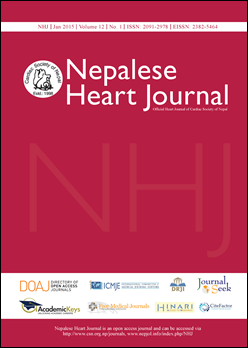Right Anterolateral Thoracotomy an Alternative to Median Sternotomy for Closure of Atrial Septal Defect: A Cosmetic Approach in Young Females
DOI:
https://doi.org/10.3126/njh.v12i1.12408Keywords:
Atrial septal defects, Median sternotomy, Right anterolateral thoracotomyAbstract
Background and Aims: Atrial septal defect operation is a safe and low-risk procedure. Cosmetic results have been an important issue, so right anterolateral thoracotomy approach has been used for repair. We present minimally invasive ASD closure via limited right anterolateral thoracotomy, as our early experience in road of minimally invasive cardiac surgery.
Methods: This study was done in the Manmohan Cardiothoracic and Transplant Center in the time period of 2012 to 2013. The study included 70 patients aged 15 – 35 years old (22.1±5.5) admitted for surgical repair of their secundum atrial septal defects. The patients were randomly allocated into one of two groups according to the approach used in their operation. Right anterolateral thoracotomy(RALT) group included 35 patients operated via right anterolateral thoracotomy.and median sternotomy(MS) group included 35 patients operated via the median sternotomy.
Result: Of 70 patients only 63 patients meet the criteria for analysis. There was no statistically significant difference between the 2 groups regarding their demographic data and duration of operation. Postoperative pleural/pericardial effusion and
pneumothorax occurred in 2.1% of patients in MS and 6.6% in Right anterolateral thoracotomygroup (p= 0.001). Total in hospital pain score was high in sternotomy group than thoracotomy group, but did not reach statistically significant values. There was no operative or late mortality or morbidity in the early follow-up (range, 1 m to 2 years, mean 1.34 yrs).
Conclusion: RALT is a safe and effective alternative approach to MS incision for ASD closure.
Nepalese Heart Journal | Jan 2015 | Volume 12 | No.1
Page : 21-25
Downloads
Downloads
Published
How to Cite
Issue
Section
License
This license enables reusers to distribute, remix, adapt, and build upon the material in any medium or format, so long as attribution is given to the creator. The license allows for commercial use.




